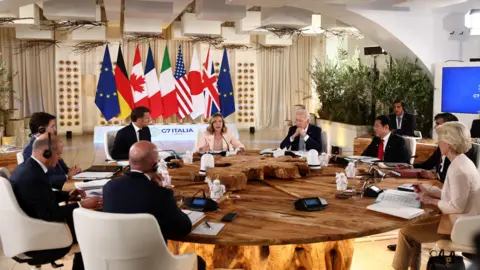“A large part will be devoted to Ukraine, our defence and economic resilience,” he said in a post on Telegram.
The White House says the G7 has made good progress on a US plan to use frozen Russian assets to raise $50bn (£39bn) a year for his country.
Mr Zelensky, who will attend the summit in Italy, is also expected to sign new security deals with Japan and the United States.
The G7 nations of Canada, France, Germany, Italy, Japan, the UK and US have been important financial and military supporters of Ukraine since Russia’s full-scale invasion in 2022.
The Russian assets that were frozen by the group, alongside the EU, when Moscow invaded Ukraine amount to $325bn.
Under international law, countries cannot confiscate those assets from Russia and give them to Ukraine.
But the pot is generating a lot of interest – around $3bn a year – so the idea is to use that interest in a creative way.
The plan is to take out a loan on the international markets, give about $50bn to the Ukrainians each year, and use the $3bn to pay off the interest on that loan each year.
It sounds relatively straightforward, but it is hugely complicated.
There are still lots of technicalities to sort out.
President Biden’s security adviser Jake Sullivan says the “major tentpoles” of the plan have been decided and that a good outcome is likely.
In recent weeks Russian officials have spoken about the idea of taking the interest from seized assets as “theft”.

With Mr Biden in the middle of a close election contest, and several other Western leaders lagging in the polls, there is pressure to deliver support to Ukraine while they still can.
The UK’s Prime Minister Rishi Sunak, who faces an upward struggle ahead of next month’s general elections, is set to announce up to $309m in support for Ukraine’s energy and humanitarian needs.
Also facing voters soon is the party of French President Emmanuel Macron, who called a snap parliamentary election after a resounding loss to the far-right National Rally in last weekend’s elections to the EU’s parliament.
Italy’s Giorgia Meloni has boasted that her country was heading into this summit with “the strongest government of all”, after a strong performance in the European elections last weekend.
The shaky political situation in many G7 countries is causing some observers to have low expectations about what can be achieved.
Natalie Tocci, the director of the Italian Institute for International Affairs, warned that “if anything will come out of this summit, it’s the fear of a catastrophe playing out before our eyes,” citing possible new governments led by Donald Trump in the US and the far-right in France on the horizon.
Pope Francis – who will become the first pontiff to attend a G7 summit – will be addressing the subject of artificial intelligence at the conference.
He has previously called for global regulation of AI, warning of its danger to ethics and human rights.

